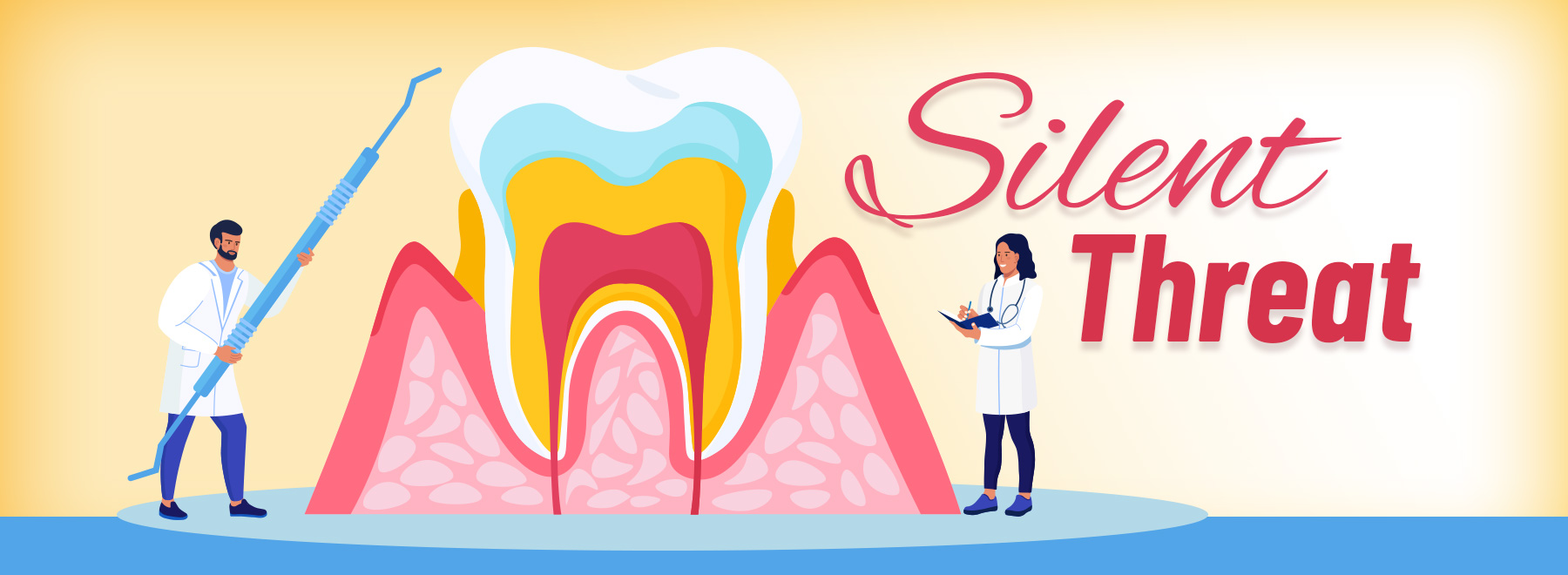Untreated gum disease can lead to poor overall health
Gum disease, often underestimated and overlooked, is one of the most common preventable diseases in the world. Studies estimate that some form of periodontal disease affects over 42% of the adult population in the United States. And its repercussions extend far beyond the mouth.
Recent research has shed light on the profound impact of gum disease, formally known as periodontal disease, on various systems in the body. Understanding this connection is crucial for maintaining both oral hygiene and overall well-being.

"There are so many systemic conditions that are linked to poor oral health,” said Reagan Spengler, dental hygiene instructor at the University of Mississippi Medical Center School of Dentistry. “I think the education about how serious gum disease is just isn’t out there. People think that bleeding when they brush and floss is normal, but it’s a sign of inflammation caused by bacteria.”
Redness, bleeding, and tenderness of the gums occur in the beginning stages of periodontal disease. Spengler said that once those symptoms subside, your body has adapted to the bacteria, allowing it to take root below the gums where it will continue to flourish.

“I tell patients that if they are familiar with high blood pressure, it is known as the ‘silent killer’,” said Dr. Jennifer Bain, professor and chair of the Department of Periodontics and Preventative Sciences. “It is causing damage and ultimately death and you may not have had a single noticeable symptom. I consider periodontal disease the silent killer of teeth because in much the same way the tissue and bone around the tooth can be slowly lost overtime and you may have little to no symptoms— or the symptoms are frequently ignored or written off as something else.”
Gum disease initiates with the accumulation of plaque, a sticky film of bacteria that forms on teeth. If not removed through proper oral hygiene practices like brushing and flossing, plaque hardens into tartar, leading to gum inflammation known as gingivitis. Left untreated, gingivitis can progress to periodontitis, causing irreversible damage to the gums and supporting structures of the teeth.
“There are an estimated 10-20 square centimeters of ulcerated surface area and tissue necrosis in moderate periodontal disease,” said Bain. “If this size wound was unsealing on the skin, you would be very concerned— yet 50% of adults in the U.S. have this size wound in a bacterial filled oral cavity and don't know it.”
The consequences of gum disease extend well beyond oral discomfort and tooth loss, however. Research has established a strong association between gum disease and various systemic conditions, including diabetes, cardiovascular diseases, respiratory infections, adverse pregnancy outcomes, and neurological diseases.
Diabetes and gum disease often form a dangerous symbiotic relationship. Poorly controlled diabetes impairs the body's ability to fight infections, making individuals with diabetes more susceptible to gum disease. Conversely, the inflammation associated with gum disease can affect blood sugar levels, aggravating diabetes management and increasing the risk of complications.
“Whether that’s just not having good routines as far as taking care of yourself or you have uncontrolled diabetes or heart disease, almost always there is some sort of bacterial link to your mouth,” Spengler said. “That’s not to say that gum disease causes these systemic conditions, but they do have a bidirectional relationship, meaning that if your diabetes is uncontrolled, you likely have uncontrolled periodontal disease or if you have uncontrolled periodontal disease, you’re going to have a hard time lowering your A1C.”
Cardiovascular diseases, including heart attacks and strokes, have also been linked to gum disease. The inflammation caused by periodontitis can contribute to the formation of plaques in the arteries, increasing the risk of blood clots and compromising cardiovascular health. Additionally, the bacteria from infected gums can enter the bloodstream, potentially exacerbating a number of other health conditions.
Practicing good oral hygiene habits, including regular brushing, flossing, and dental check-ups, is the cornerstone of gum disease prevention. Studies show that without consistent quality oral hygiene, gingivitis can occur in a couple of weeks. Professional dental cleanings can remove plaque and tartar buildup, reducing the risk of gum inflammation and disease progression.
“It starts at home, being consistent with the daily removal of plaque,” Spengler said. “It grows and spreads very quickly, so if you give it a stable environment and don’t mechanically remove it by brushing and flossing on a daily basis, it sets up shop.
“Once plaque becomes tartar, it can only be removed by a dental professional,” she said. “But people need to know that it is reversible at this stage. After it progresses, though, and your body no longer has the immune response to fight it off, that’s when you move into the loss of attachment and loss of bone.”
Oral health is far more crucial to our overall systemic health than most realize. By recognizing the link between gum disease and other health issues, individuals can take proactive steps to protect themselves from its detrimental effects. Through consistent oral hygiene practices and timely dental interventions, we can safeguard both our smiles and our well-being.
To speak to someone in the Department of Periodontics and Preventative Sciences or Department of Dental Hygiene or to schedule an appointment, call 601-984-6185 or go online to umc.edu/healthcare/make-an-appointment.
The above article appears in CONSULT, UMMC’s monthly e-newsletter sharing news about cutting-edge clinical and health science education advances and innovative biomedical research at the Medical Center and giving you tips and suggestions on how you and the people you love can live a healthier life. Click here and enter your email address to receive CONSULT free of charge. You may cancel at any time.



